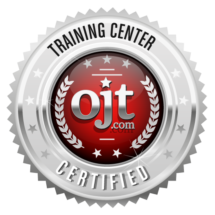
INDUSTRY-LEADING LIVE
INSTRUCTOR-LED TRAINING
World Class Training Content, Delivered On-Demand
BRIDGING THE GAP
between career seekers
& employers
from COAST-TO-COAST

World Class Training Content, Delivered On-Demand
between career seekers
& employers
from COAST-TO-COAST
Respiratory Therapist (RT)
QUALIFICATIONS
A certificate, high school or General Educational Development (GED) diploma, or Associate’s degree involving 2 to 4 years of clinical instruction-based “Respiratory Care” study and practice credit hours accredited by a nationally recognized certifying body, such as the Commission on Accreditation for Respiratory Care (CoARC) , and must pass exams administered by them to become a Certified Respiratory Therapist (CRT) and obtain a Licensure from the American Association of Respiratory Care (AARC); combined with Respiratory Therapy – On the Job Training (OJT) programs, Apprenticeships, Respiratory Therapy Healthcare Workforce Job Training or Experience; that include topics and Respiratory Therapy practice covering Respiratory Therapy concepts and its application areas, body, respiratory organs like lungs and heart, disease conditions and infections like breathlessness, asthma & bronchitis, chronic obstructive pulmonary disease (COPD) and pneumonia; Respiratory Therapy procedures, practices; including breathing exercises, yoga and data collection, drugs, equipment and devices like inhalers, nebulizers, bronchodilators etc.; and treatment procedures and methodologies, reporting and documentation standards, professional ethics, and health information technology.
AVERAGE HOURLY PAY
(Credits: www.payscale.com)
| Entry-level (0-12 months) | $ 23.63 |
| Early career (1-4 years) | $ 24.76 |
| Mid-career (5-9 years) | $ 26.98 |
| Experienced (10+ years) | $ 29.01 |
PROJECTED GROWTH
(Credits: www.bls.gov)
Respiratory Therapist is an excellent career, in which employment is projected to grow at a blistering 19 percent from 2019 to 2029.
SKILLS/ TRAITS NEEDED
Besides good respiratory therapy, equipment, and organ function knowledge, the Respiratory Therapist must be professional, ethical, “patient-centric”, proactive, agile, and alert with a high degree of patience, perseverance and have great listening, interpersonal, communication skills, compassion, caring, empathy, dexterity, time management & prioritization; and most importantly be extremely flexible and committed to performing the Respiratory Therapist duties and responsibilities. They are expected to be “patient-centered” and comforting; having a good working knowledge of medical terminology, expertise in respiratory therapy and its devices, reading, interpreting, and reporting organ malfunction/ progress, and other medical findings, besides suggesting further treatment, drugs, and procedures; be self-organized, and liaise & report effectively and efficiently with the Medical Team and the patient’s household taking necessary precautions, comforting, and following the health protocols for the good health, fitness, well being, and safety of the patients.
WORK FUNCTIONS
Respiratory Therapists, use equipment and peripherals like bronchodilators, inhalers, nebulizers, and oxygen, dilatory and relaxing breathing exercises including yoga to help the patient breathe properly, and enhance the respiratory, lung, and heart function; helping cure lung infections, bronchitis, asthma, and cardiovascular-related disease conditions. They also help smokers to quit smoking urges through respiratory exercises and yoga. They acquire, examine, analyze, perform clinical assessment and prepare relevant reports; helping the doctor diagnose and treat various respiratory medical conditions. Allied responsibilities include explaining the diagnostic procedure to and comforting the patient, identifying, and interpreting normal and abnormal technical findings, maintaining the medical records, respiratory equipment, and supplies; addressing problems and inquiries from the patient, and managing the department. They may sometimes be needed to work in shifts.
Related Careers